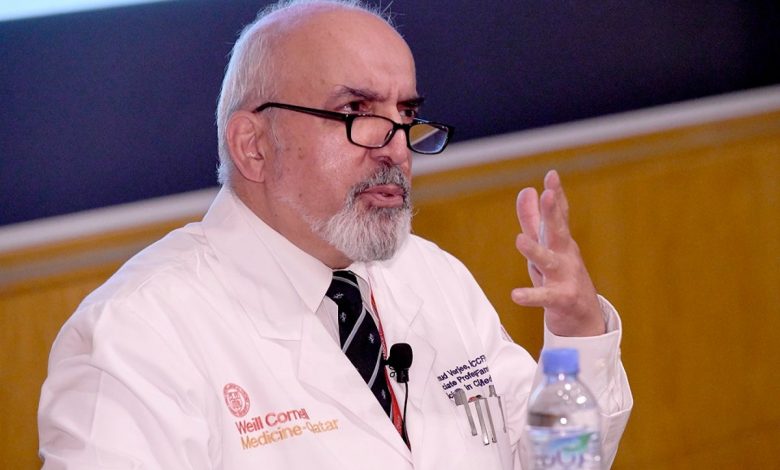
No reason to panic over coronavirus: Qatar Foundation medical expert
أستاذ طب الأسرة بمؤسسة قطر: لا يوجد سبب للقلق من فيروس كورونا
People in Qatar should not panic about a new coronavirus that has spread to almost 3,000 people and claimed 80 lives, according to a Qatar Foundation(QF) medical expert who has said that the outbreak is a reminder of the need to be hygiene-conscious.
The virus, which has no vaccine or cure, emerged in China – where its source city, Wuhan, is now in lockdown – but at least 41 cases have also been confirmed in Thailand, the US, Singapore, Australia, Taiwan, Malaysia, France, Japan, South Korea, Vietnam, Nepal, and Canada.
Causing severe acute respiratory infection, it is a new coronavirus, a variant of which – Sars – led to hundreds of deaths 17 years ago. But Dr Mohamud A Verjee, Associate Professor of Family Medicine in Clinical Medicine at QF partner university Weill Cornell Medicine-Qatar, said it should not cause a public scare.
“At this stage, it does not seem to be as bad as Sars, which proved quite harmful,” he said. “This coronavirus is difficult to assess accurately because it is a new strain of the same virus, but while there have sadly been deaths, it is not something that should be frightening people in Qatar – it is just a case of being aware.
“Sars was quite virulent and even harmed carers of patients, but this virus does not seem to have this kind of potential. That is reassuring, and there is no reason to panic.
Many of those affected by the virus are male, over 40, and already have an infection or illness, with symptoms being a high fever – 39 degrees or more – followed by a dry cough, and then breathlessness or breathing difficulties. The symptoms can appear within two days or after as long as 14 days.
Dr Verjee said that Qatar has precautions in place to prevent the virus being unwittingly carried into the country. “The authorities have been very quick to act and immediately deployed special thermal cameras at Hamad International Airport, which screen people for high temperatures as they enter Qatar and allow them to be spotted for follow-up checks,” he said.
As for measures that people themselves can take, Dr Verjee advised they should regularly wash their hands with soap and water for at least 20 seconds; not touch their eyes, nose, and mouth with unwashed hands; and avoid contact with people who are visibly ill and coughing or sneezing, as well as covering their own cough.
And he said differentiating between potential signs of the virus and standard flu symptoms should be straightforward. “Flu has a different set of symptoms – as well as the high temperature, people with flu also tend to have severe headaches, a sore throat, muscle or joint pain, a runny nose, and extreme fatigue,” he said.
“All physicians are well-informed and should be able to tell the difference between coronavirus and flu quite easily. Even so, you have to remember that flu can also kill, and those who have not already had their flu vaccination should consider getting this protection every year.”
There have been reports that people may avoid ordering goods from China due to concerns about the virus, but Dr Verjee said, “Essentially, this virus is spread from humans to humans – a brand-new piece of material, wrapped up, is unlikely to contain anything nasty. But it is up to people to make their own decision.”
Dr Verjee also dismissed any prospect of an immediate vaccine, said, “There is no chance of a vaccine within days – it takes a long time to develop.
“The best thing is simply to be well aware of the importance of good hygiene and avoid contact with people who are obviously ill or who may have just come from the region where the outbreak began. It is also wise not to travel to that area of China, which has in any case been quarantined. But it should be borne in mind that most people who get this virus will recover.”
أكدت وزارة الصحة العامة، مساء أمس، أنه لم يتم رصد أي حالة إصابة بفيروس كورونا المستجد في البلاد. ودعت الوزارة الجمهور إلى عدم الالتفات لأية معلومات غير صادرة عن الجهات المختصة، وضرورة استقاء المعلومات من مصادرها الرسمية الموثوقة. على جانب آخر أكد الدكتور محمد فرجي، أستاذ مشارك طب الأسرة، وعميد مساعد لشؤون الطلاب في «وايل كورنيل للطب – قطر»، إحدى الجامعات الشريكة لمؤسسة قطر، أن فيروس «كورونا» لم يصل إلى المرحلة السيئة التي وصل إليها فيروس «سارس»، والذي أثبت حينها أنه ضارّ للغاية.
قال الدكتور محمد فرجي: «لا يوجد سبب للقلق من «كورونا»، وإن غالبية المصابين في العالم بالفيروس هم من الذكور الذين تجاوزوا سن الأربعين، وممن يعانون أصلاً من حالة مرضية، لافتاً إلى الإجراءات الاحترازية التي اتخذتها الجهات المعنية في قطر لمنع دخول الفيروس إلى البلاد، واصفاً إياها بالسريعة والفعالة ومن بينها نشر الكاميرات الحرارية في مطار حمد الدولي، لرصد درجة حرارة المسافرين عن بُعد عند دخولهم البلاد، بما يسمح بإجراء الفحوصات اللازمة في حال الضرورة».
وفيما يتعلق بالتدابير الوقائية، نصح الدكتور محمد فرجي بضرورة غسل اليدين بانتظام بالماء والصابون لمدة 20 ثانية على الأقل، وتجنب لمس العيون والأنف قبل غسل الأيدي، وتجنب الاتصال عن قرب مع الذين يعانون من عوارض مثل السعال والعطس، مع التأكيد على أهمية تغطية الأنف والفم عند ذلك، وهذا احتراز طبيعي يتم اتباعه حتى في حالات الزكام.
وأوضح أن عوارض الإنفلونزا تختلف عن عوارض «كورونا»، فبالإضافة إلى ارتفاع درجة الحرارة، فإن الأشخاص المصابين بالإنفلونزا يميلون إلى الشعور بالصداع، التهاب الحلق، آلام العضلات والمفاصل، سيلان الأنف، الإرهاق الشديد، مضيفاً: «الأطباء بشكل عام لديهم دراية جيدة بكيفية التمييز بين الأعراض، ومعرفة الفوارق بسهولة، وشدد على أهمية الحصول على لقاح الإنفلونزا المتاح في المراكز الصحية والعيادات الطبية في قطر، من أجل الحماية أيضاً من الإنفلونزا».
ونفى د. فرجي أي احتمال لوجود لقاح فوري لفيروس «كورونا» حتى الآن، لافتاً إلى أن تطوير أي لقاح يستغرق وقتاً طويلاً، ودعا إلى أهمية النظافة وتجنب الاتصال بالأشخاص المصابين بعوارض واضحة، أو القادمين من المنطقة التي بدأ فيها انتقال المرض.



